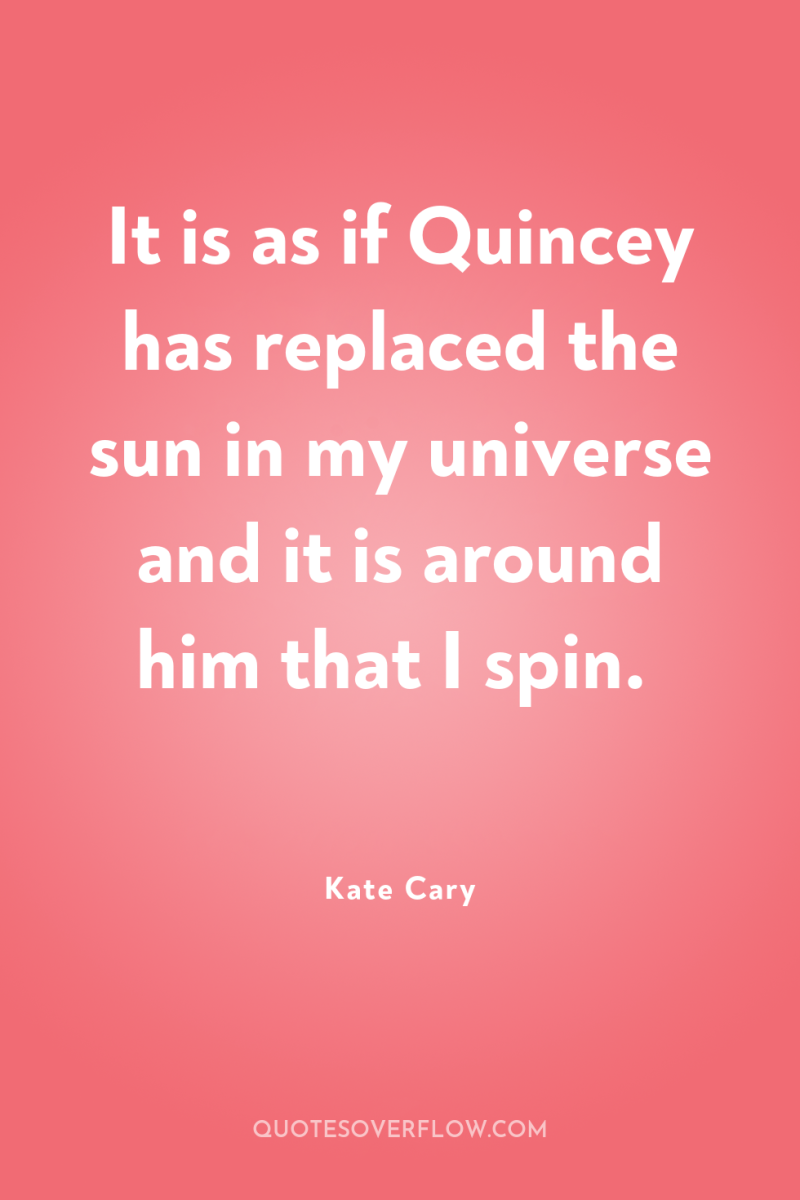
1
It is as if Quincey has replaced the sun in my universe and it is around him that I spin.Kate Cary
2
(On WWI:)A man of importance had been shot at a place I could not pronounce in Swahili or in English, and, because of this shooting, whole countries were at war. It seemed a laborious method of retribution, but that was the way it was being done..A messenger came to the farm with a story to tell. It was not a story that meant much as stories went in those days. It was about how the war progressed in German East Africa and about a tall young man who was killed in it.. It was an ordinary story, but Kibii and I, who knew him well, thought there was no story like it, or one as sad, and we think so now. The young man tied his shuka on his shoulder one day and took his shield and his spear and went to war. He thought war was made of spears and shields and courage, and he brought them all. But they gave him a gun, so he left the spear and the shield behind him and took the courage, and went where they sent him because they said this was his duty and he believed in duty..He took the gun and held it the way they had told him to hold it, and walked where they told him to walk, smiling a little and looking for another man to fight. He was shot and killed by the other man, who also believed in duty, and he was buried where he fell. It was so simple and so unimportant. But of course it meant something to Kibii and me, because the tall young man was Kibii's father and my most special friend. Arab Maina died on the field of action in the service of the King. But some said it was because he had forsaken his spear. .Beryl Markham
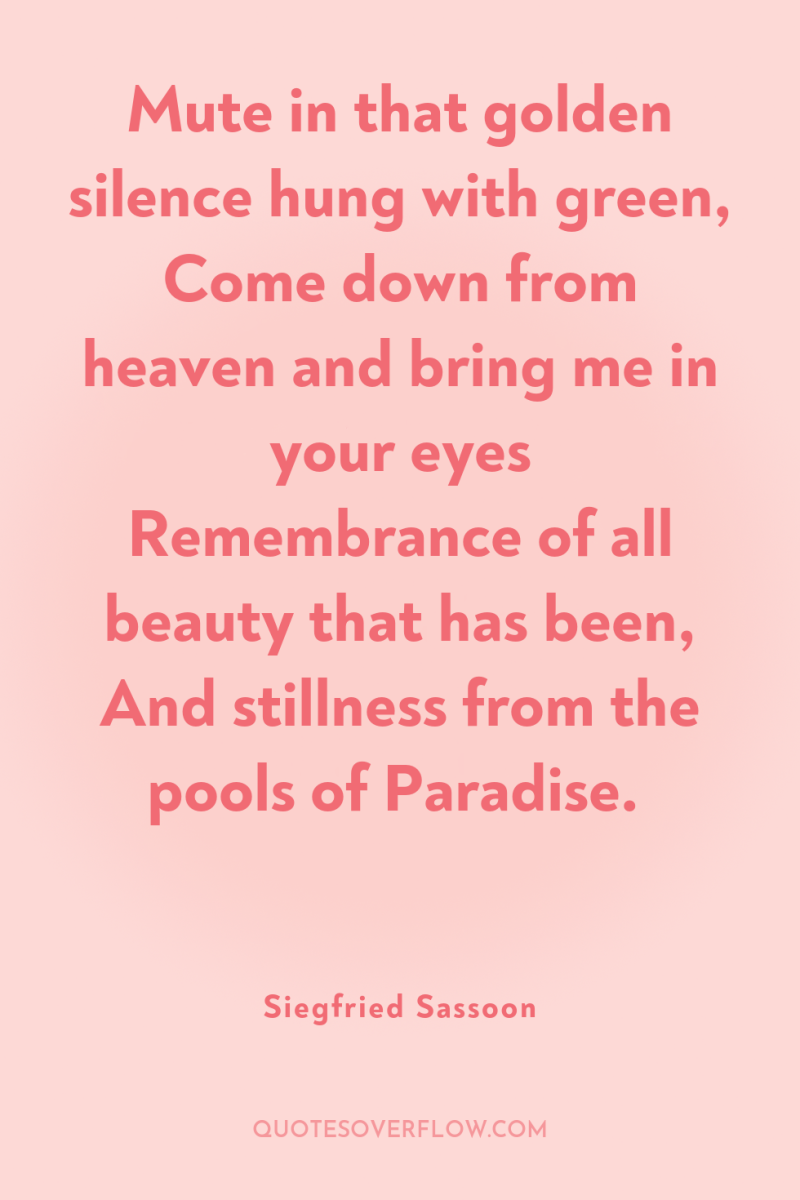
3
Mute in that golden silence hung with green, Come down from heaven and bring me in your eyes Remembrance of all beauty that has been, And stillness from the pools of Paradise.Siegfried Sassoon
4
If you can walk with the crowd and keep your virtue, or walk with Kings-nor lose the common touch; If neither foes nor loving friends can hurt you; If all men count with you, but none too much; If you can fill the unforgiving minute with 60 seconds worth of distance run- Yours is the earth and everything that's in it, And-which is more-you'll be a man my son.Rudyard Kipling

5
I know. I was there. I saw the great void in your soul, and you saw mine.Sebastian Faulks
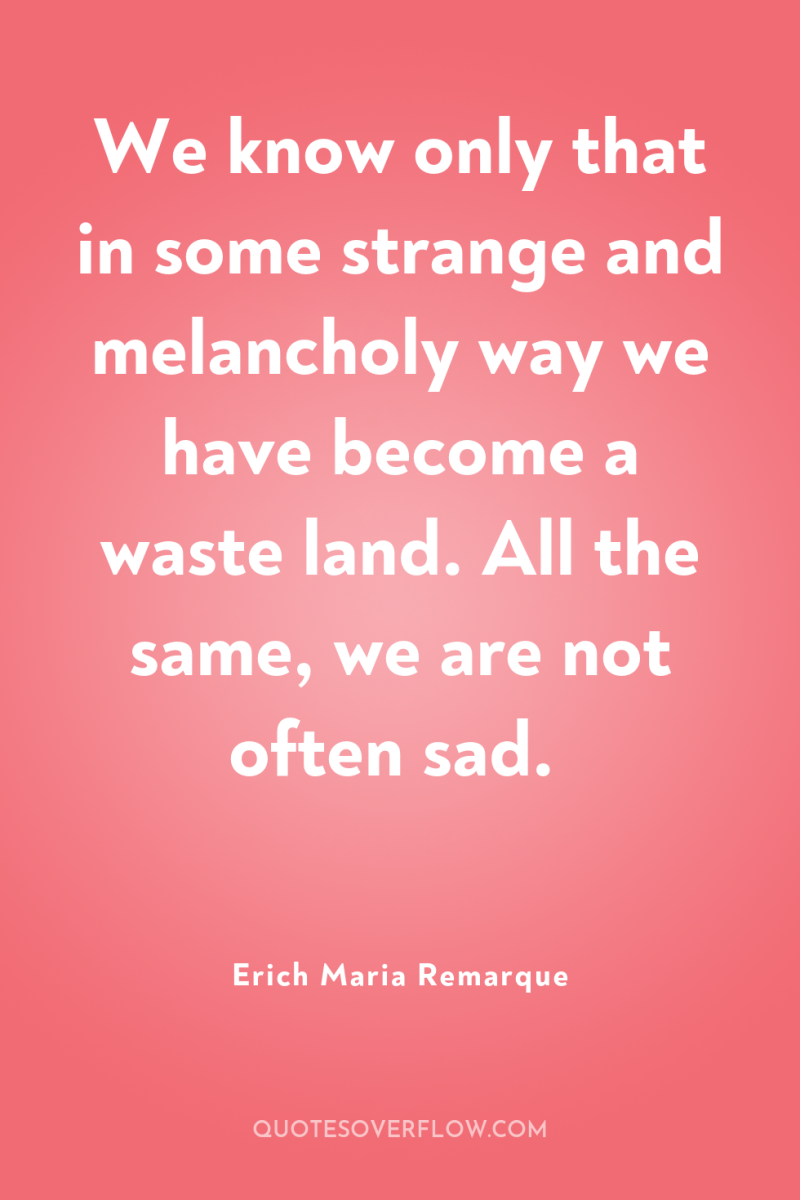
6
We know only that in some strange and melancholy way we have become a waste land. All the same, we are not often sad.Erich Maria Remarque
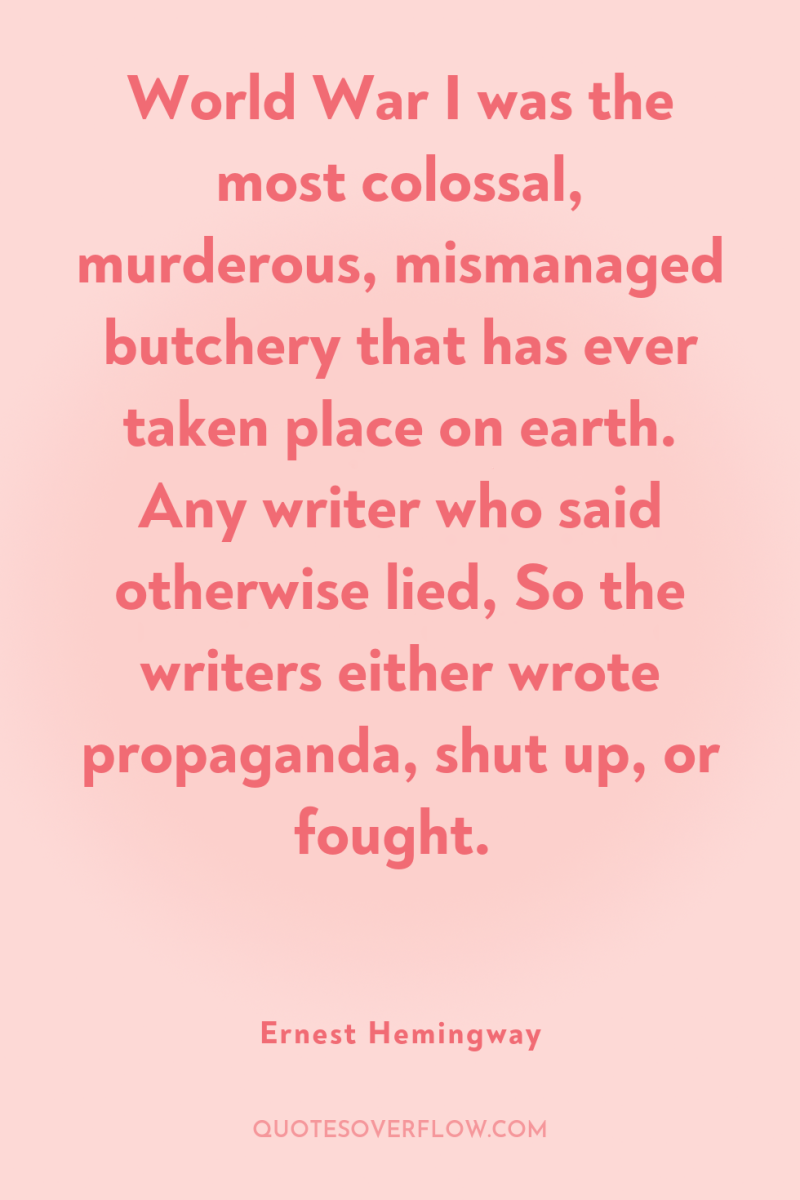
7
World War I was the most colossal, murderous, mismanaged butchery that has ever taken place on earth. Any writer who said otherwise lied, So the writers either wrote propaganda, shut up, or fought.Ernest Hemingway
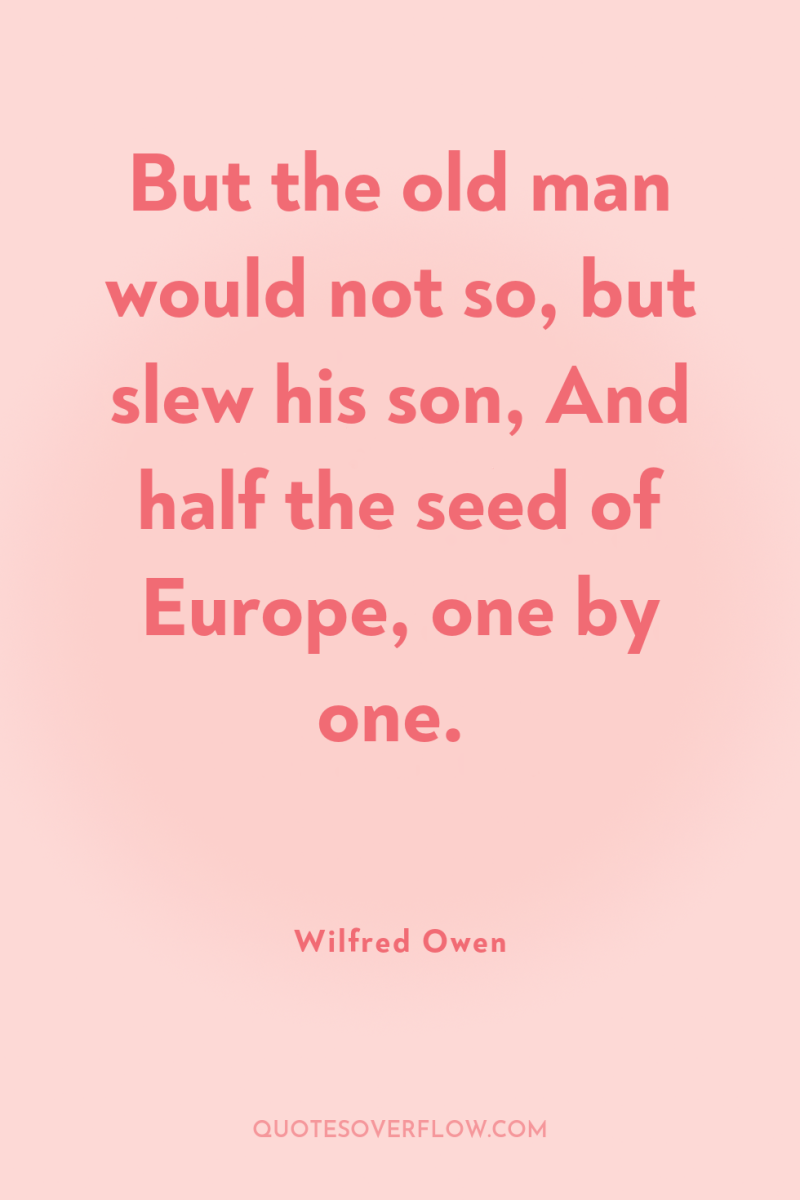
8
But the old man would not so, but slew his son, And half the seed of Europe, one by one.Wilfred Owen
9
This book is not about heroes. English poetry is not yet fit to speak of them. Nor is it about deeds, or lands, nor anything about glory, honour, might, majesty, dominion, or power, except War. Above all I am not concerned with Poetry. My subject is War, and the pity of War. The Poetry is in the pity.Wilfred Owen
10
He had volunteered early, rather than waiting to be conscripted, for he felt a duty and an obligation to serve, and believed that ... being willing to fight for his country and the liberty it represented, would make some small difference.... His idealism was one of the casualties of the carnage [of Verdun].Iain Pears
11
I am a messenger who will bring back word from the men who are fighting (WWI) to those who want the war to go on forever. Feeble, inarticulate will be my message, but it will have a bitter truth and may it burn their lousy souls.Paul Nash
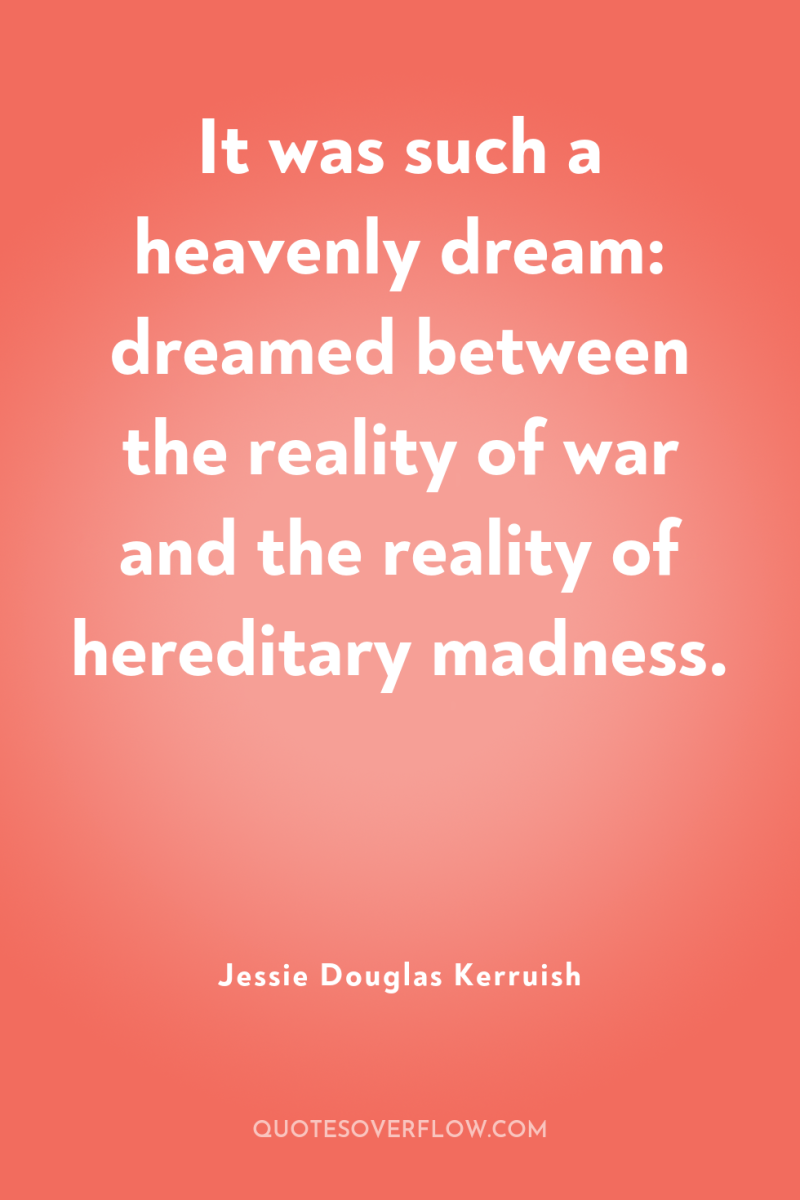
12
It was such a heavenly dream: dreamed between the reality of war and the reality of hereditary madness.Jessie Douglas Kerruish
13
There were thousands of Kantoreks, all of whom were convinced that they were acting for the best–in a way that cost them nothing. And that is why they let us down so badly. …in our hearts we trusted them. The idea of authority, which they represented, was associated in our minds with a greater insight and a more humane wisdom. But the first death we saw shattered this belief. We had to recognize that our generation was more to be trusted than theirs. They surpassed us only in phrases and in cleverness the first bombardment showed us our mistake, and under it the world as they had taught it to us broke in pieces. While they continued to write and talk, we saw the dying. While they taught that duty to one’s country is the greatest thing, we already knew that death-throes are stronger. But for all that we were no mutineers, no deserters, no cowards–they were very free with all these expressions. We loved our country as much as they; we went courageously into every action; but also we distinguished the false from true, we had suddenly learned to see. And we saw that there was nothing of their world left. We were all at once terribly alone; and alone we must see it through. .Erich Maria Remarque
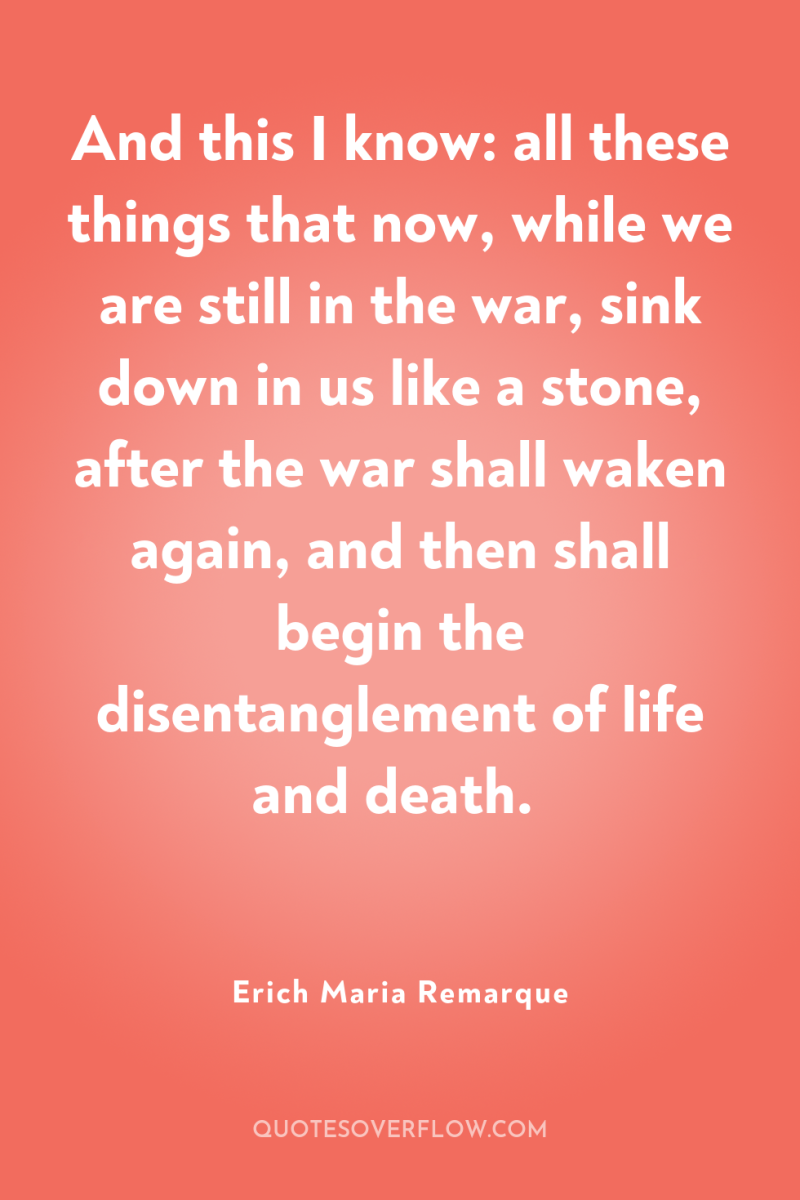
14
And this I know: all these things that now, while we are still in the war, sink down in us like a stone, after the war shall waken again, and then shall begin the disentanglement of life and death.Erich Maria Remarque

15
A man dreams of a miracle and wakes up to loaves of bread.Erich Maria Remarque
16
He wants me to tell him about the front; he is curious in a way that I find stupid and distressing; I no longer have any real contact with him. There is nothing he likes more than just hearing about it. I realize he does not know that a man cannot talk of such things; I would do it willingly, but it is too dangerous for me to put these things into words. I am afraid they might then become gigantic and I be no longer able to master them. What would become of us if everything that happens out there were quite clear to us? .Erich Maria Remarque
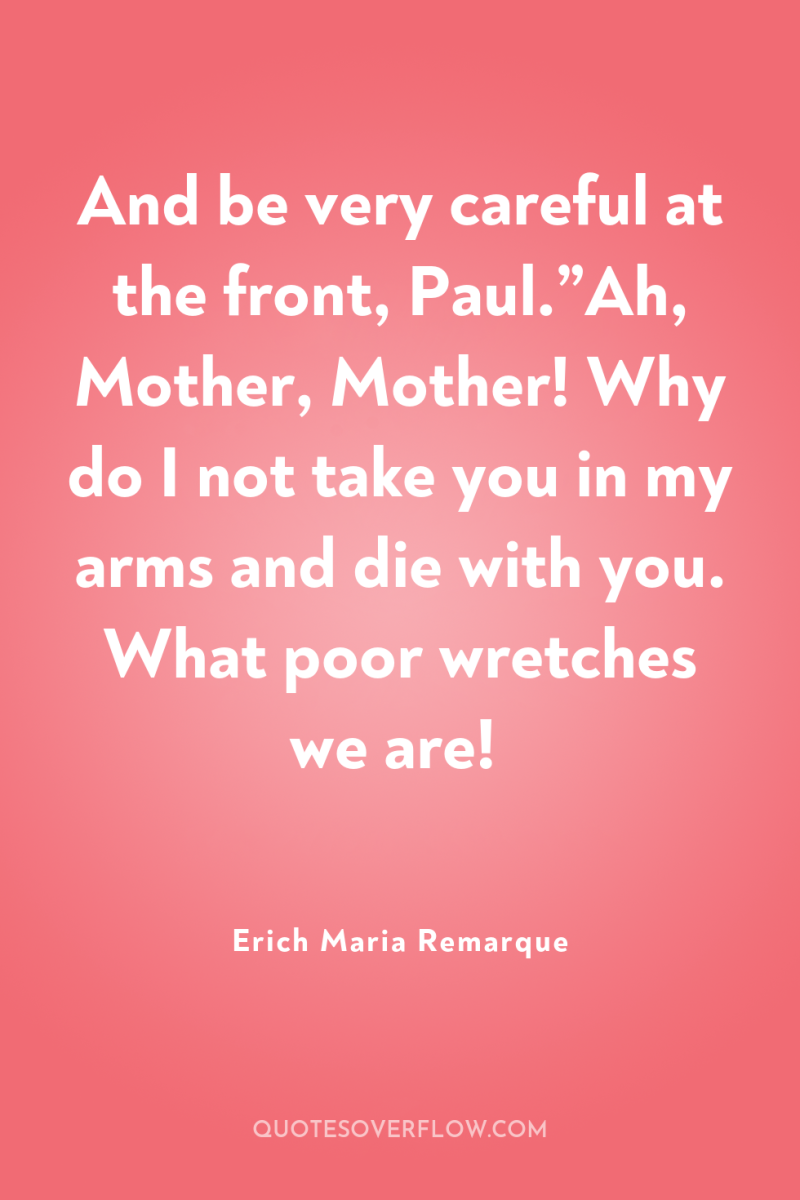
17
And be very careful at the front, Paul.”Ah, Mother, Mother! Why do I not take you in my arms and die with you. What poor wretches we are!Erich Maria Remarque
18
The rocket was beautiful. In conception it had been shaped by an artist to break a chain that had bound the human race ever since we first gained consciousness of earth's gravity and all it's analogs in suffering, failure and pain. It was at once a prayer sent heavenward and the answer to that prayer: Bear me away from this awful place.Michael Chabon
19
Cripes, just listen to that desperation mixed with a wild joie de vivre. That doesn't come out of nothing. They'll be able to hear that a massive eruption once rocked the world and scattered pain and passion in it's wake.Cat Winters
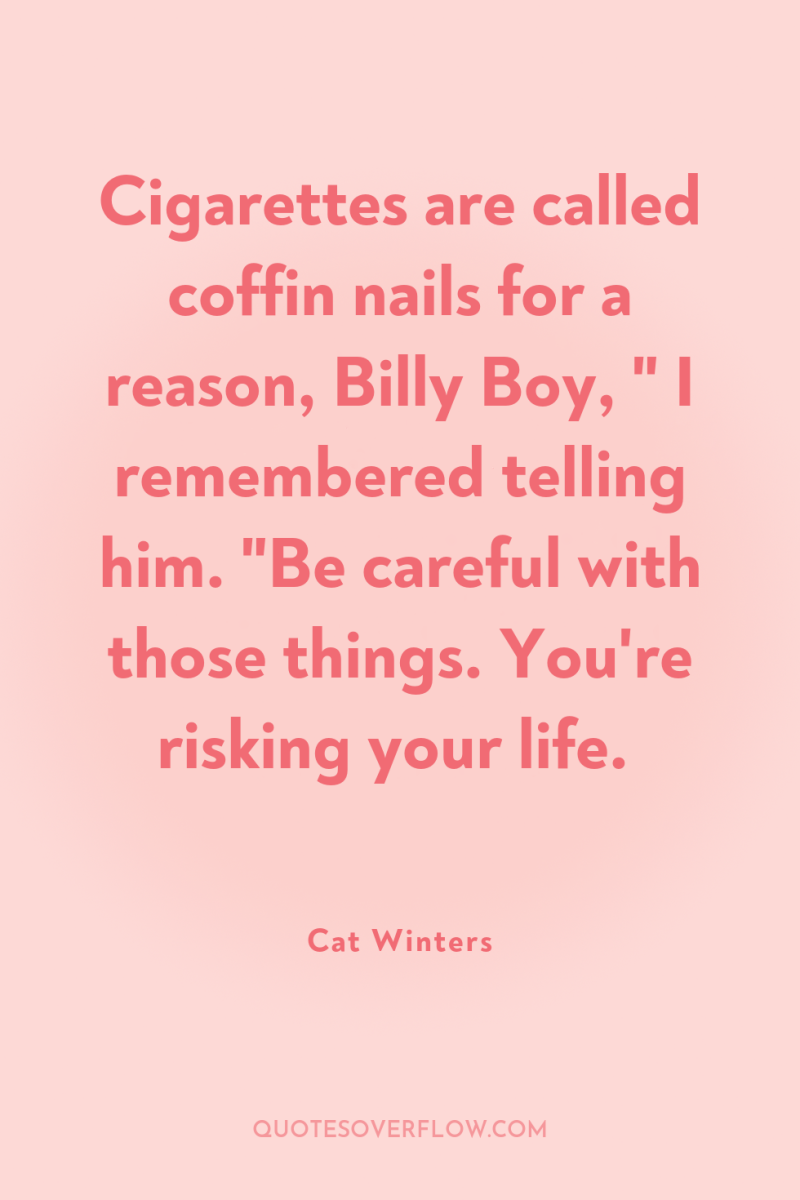
20
Cigarettes are called coffin nails for a reason, Billy Boy, " I remembered telling him. "Be careful with those things. You're risking your life.Cat Winters
21
What remains to us here, behind the Yser, is not much more than a strip of land almost impossible to defend; a few rain-soaked trenches around razed villages; roads blown to smithereens, unusable by any vehicle; a creaky old horse cart we haul around ourselves, loaded with crates of damp ammunition that are constantly on the verge of sliding into a canal, forcing us to slog like madmen for every ten yards of progress as we stifle our warning cries; the snarling officers in the larger dug-outs, walled off with boards, where the privates have to bail water every day and brush the perpetual muck off their superiors’ boots; the endless crouching as we walk the trenches, grimy and smelly; our louse-ridden uniforms; our arseholes burning with irritation because we have no clean water for washing them after our regular attacks of diarrhoea; our stomach cramps as we crawl over heavy clods of earth like trolls in some gruesome fairy tale; the evening sun slanting down over the barren expanse; infected fingers torn by barbed wire; the startling memory of another, improbable life, when a thrush bursts into song in a mulberry bush or a spring breeze carries the smell of grassy fields from far behind the front line, and we throw ourselves flat on our bellies again as howitzers open fire out of nowhere, the crusts of bread in our hands falling into the sludge at the boot-mashed bottom of the stinking trench.Stefan Hertmans
22
This is a picture of him from 1919, just after the war, looking like he slept in that uniform all the way from France. He still had that face, but he wasn't the same. I know there's men who came back changed: the Paterson boy up in Brownville hung himself that summer. Nobody talked about it much, and I suppose that was for the best. But Jack wasn't like that; it hadn't been a terrible thing for him, I don't think. Or if it had been, then it was one of those terrible things you get through and it sets you free.David F. Porteous
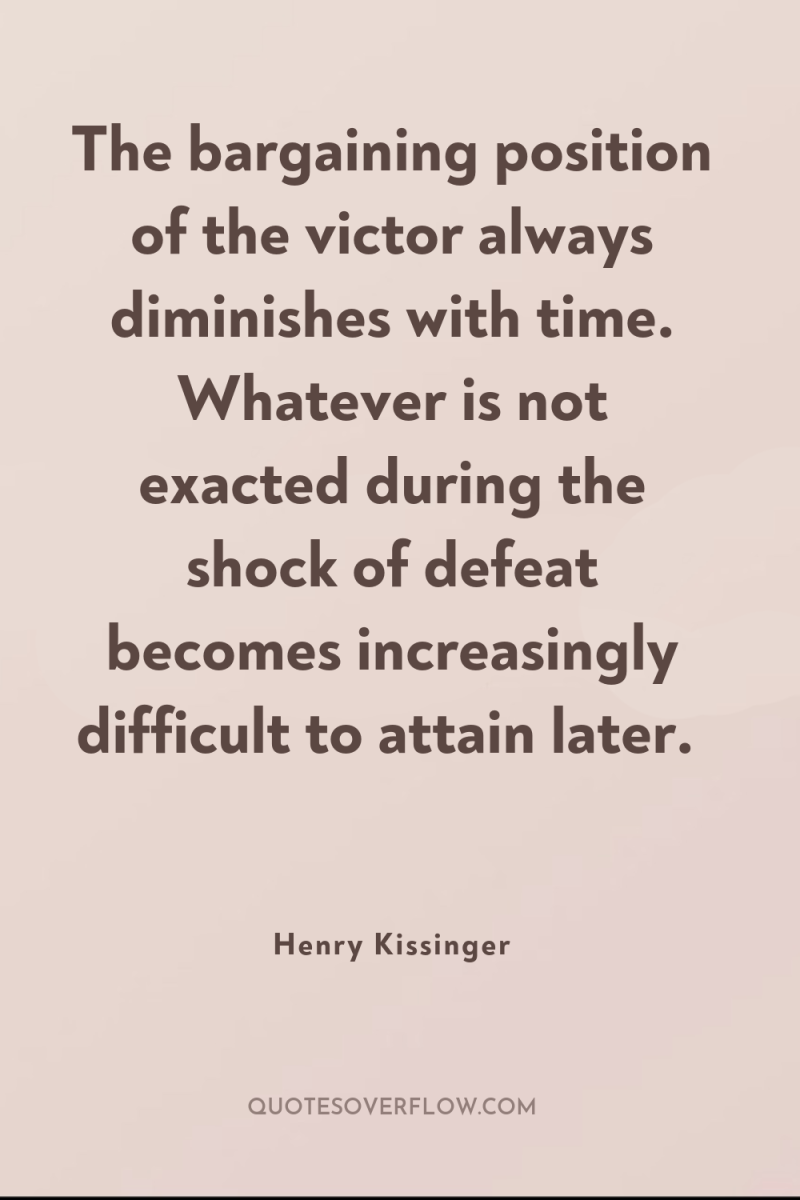
23
The bargaining position of the victor always diminishes with time. Whatever is not exacted during the shock of defeat becomes increasingly difficult to attain later.Henry Kissinger
24
In the Somme valley, the back of language broke. It could no longer carry its former meanings. World War I changed the life of words and images in art, radically and forever. It brought our culture into the age of mass-produced, industrialized death. This, at first, was indescribable.Robert Hughes
25
The implicit optimism of the [field service post card] is worth noting–the way it offers no provision for transmitting news like “I have lost my left leg” or “I have been admitted into hospital wounded and do not expect to recover.” Because it provided no way of saying “I am going up the line again, ” its users had to improvise. Wilfred Owen had an understanding with his mother that when he used a double line to cross out “I am being sent down to the base, ” he meant he was at the front again. Close to brilliant is the way the post card allows one to admit to no state of health between being “quite” well, on the one hand, and, on the other, being so sick that one is in hospital.Paul Fussell
26
We had come from lecture halls, school desks and factory workbenches, and over the brief weeks of training, we had bonded together into one large and enthusiastic group. Grown up in an age of security, we shared a yearning for danger, for the experience of the extraordinary. We were enraptured by war.Unknown
27
In a curious failure of comprehension, I looked alertly about me for possible targets for all this artillery fire, not, apparently, realizing that it was actually ourselves that the enemy gunners were trying for all they were worth to hit.Unknown
28
Men were snoring, twitching and whimpering, struggling with nightmares less terrible than reality.Gabriel Chevallier
29
Its magnificence was indescribable, and its magnitude was inconceivable. She felt overwhelmed in the presence of its greatness. Pg 87Mona Rodriguez
30
Confession is good for the soul even after the soul has been claimed” (p. 381).Mona Rodriguez
31
Why are you perpetuating a childhood you grew up despising? Pg 57Mona Rodriguez
32
If, as I have reason to believe, I have disintegrated the nucleus of the atom, this is of greater significance than thErnest Rutherford
33
Suffering is the common lot of man.Theresa Breslin
34
Victorious troops are those who kill more, and here we were the victims. This put the finishing touch to our demoralisation. The soldiers had lost conviction long ago. Now they lost confidence.Gabriel Chevallier
35
The landscape had been so maimed by this new kind of warfare it was as if human architects of great genius had sat down to plan hell, since no two of them could agree on the design of heaven.Christopher Buehlman
36
France is to me the heroine in the romance of all the nations of all time. This feeling was born in me years ago when I read how her noble sons had defended America in its cradle. Today I am proud that I am one of the millions who will come to save our heroine from the clutches of the villain from across the Rhine.William Arthur Sirmon
37
When the war (WWI) finally ended it was necessary for both sides to maintain, indeed even to inflate, the myth of sacrifice so that the whole affair would not be seen for what it was: a meaningless waste of millions of lives. Logically, if the flower of youth had been cut down in Flanders, the survivors were not the flower: the dead were superior to the traumatized living. In this way, the virtual destruction of a generation further increased the distance between the old and the young, between the official and the unofficial.Robert Hughes
38
Irony is the attendant of hope and the fuel of hope is innocence.Paul Fussell
39
Nothing so comforts the military mind as the maxim of a great but dead general.Barbara W. Tuchman
40
They bright whiten all this sepulchre with powdered chloride of lime. It's a perfectly sanitary war.David Jones
41
...and how is a man to know the habits of their God, whether He smites suddenly or withholds, if you mishandle the things set apart, the objects of His people He is jealous of.David Jones
42
For they were unseasoned, nor inured, not knowing this to be much less than the beginning of sorrow.David Jones
43
As suddenly the whole world would slip back into a mollifying, untormented dark; their aching bodies knew its calm.David Jones
44
But how intolerable bright the morning is where we who are alive and remain, walk lifted up, carried forward by an effective word.David Jones
45
I never heard communism seriously propounded or argued; perhaps I was too deeply preoccupied with my own dissipations; and, as it turned out in the end it was a way of thought that I was denied or spared by a geographical fluke. From the end of these travels till the War, I lived, with a year's interruption, in Eastern Europe, among friends whom I must call old-fashioned liberals. They hated Nazi Germany; but it was impossible to look eastwards for inspiration and hope, as their western equivalents--peering from afar, and with the nightmare of only one kind of totalitarianism to vex them--felt able to do. For Russia began only a few fields away, the other side of a river; and there, as all her neighbours knew, great wrong was being done and terrible danger lay. All their fears came true. Living among them made me share those fears and they made stony ground for certain kinds of grain.Patrick Leigh Fermor
46
MCMXIVThose long uneven lines Standing as patiently As if they were stretched outside The Oval or Villa Park, The crowns of hats, the sun On moustached archaic faces Grinning as if it were all An August Bank Holiday lark; And the shut shops, the bleached Established names on the sunblinds, The farthings and sovereigns, And dark-clothed children at play Called after kings and queens, The tin advertisements For cocoa and twist, and the pubs Wide open all day-- And the countryside not caring: The place names all hazed over With flowering grasses, and fields Shadowing Domesday lines Under wheat's restless silence; The differently-dressed servants With tiny rooms in huge houses, The dust behind limousines; Never such innocence, Never before or since, As changed itself to past Without a word--the men Leaving the gardens tidy, The thousands of marriages, Lasting a little while longer: Never such innocence again.Philip Larkin